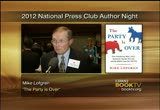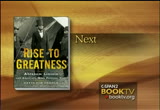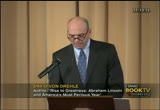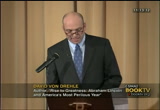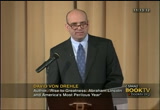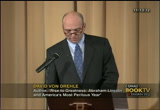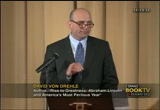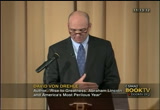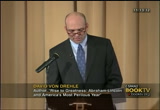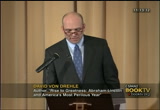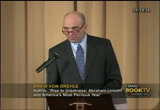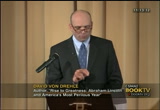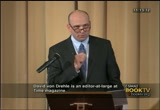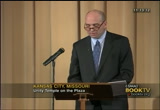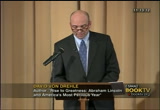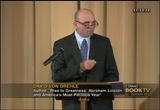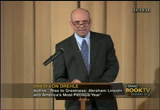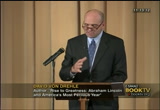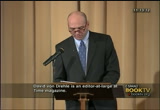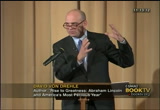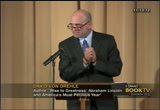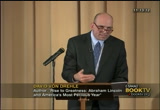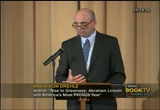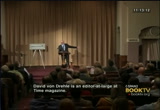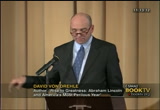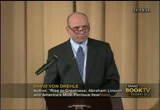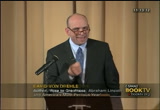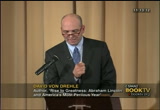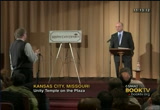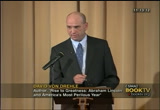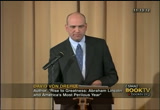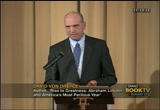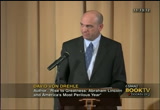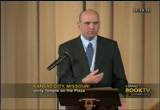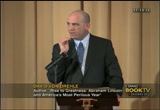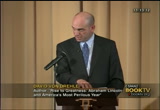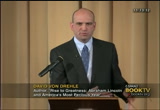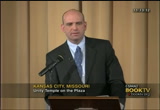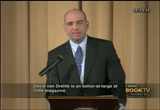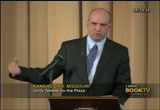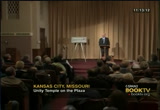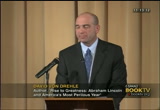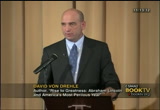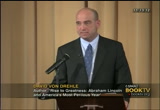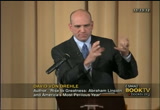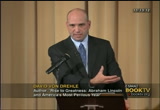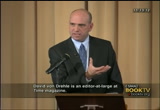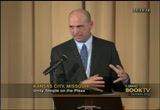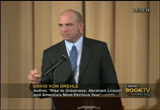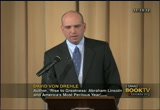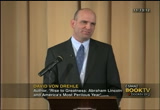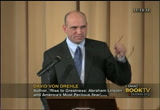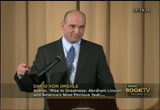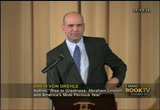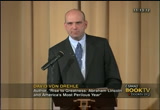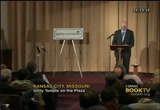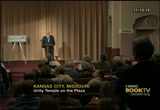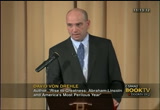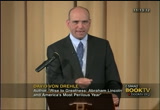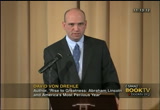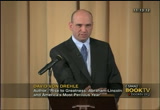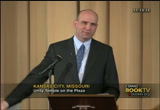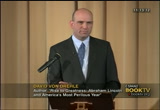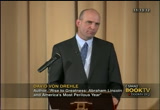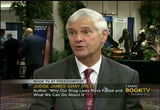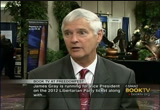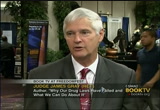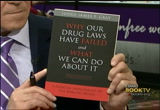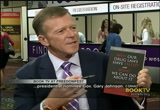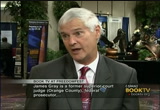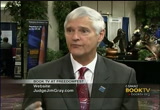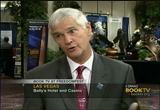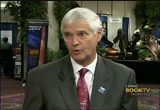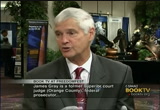tv Book TV CSPAN December 24, 2012 8:30pm-9:45pm EST
8:30 pm
pretty much fulfilled george washington's third term in national security matters. >> finally, how did the middle-class figure into your thesis? >> while the middle-class figures then, and they are the ones that got shafted because there was a bipartisan move. clinton was president. the republicans mainly were running congress when we have rings like nafta, china's most favored nation status, the wto, the world trade organization. all these trade deals -- trade deals that people believed were going to bring jobs to the united states, and in every case the jobs left. >> in now on booktv, the history of united states in 1862. is the second year the civil war and specifically reactions of president abraham lincoln.
8:31 pm
it's a little over an hour. [applause] >> the thank you very much. a wonderful crowd. thank you to regnery books, a real asset to our community here. with all these programs. i am glad to see my kids in the audience, who asked me to mention their names. henry, alice, abby, claire and my wife karen is here and my mother doris and many friends but also the basis as well. thank you all for coming out. i appreciate your time and interest. in "rise to greatness" i tell the story of the most eventful and perilous time in american history, 1862. as much as possible i tell it through the eyes of the man who guided the nation through the fire, abraham lincoln.
8:32 pm
i don't want to spoil the book for you, so let me just say that the year began with the american republic in grave danger. the union army was struggling to regrow virtually overnight from a few thousand men scattered across the continent, to more than half a billion. the inexperienced officers, the command of these were all volunteers was stymied by the sheer size of the breakaway confederate states of america. which covered a state larger than the entire european territory, conquered by napoleon. linke's closest advisor was secretary of state william henry seward. seward says that even smart people fail to see the difficulty of the union's task. they didn't apprehend the vast extent of the rebellion as he
8:33 pm
put it. military operations to be successful must be on a scale practically unknown in the art of four. yet the war department was an corrupt shambles, its chief on the verge of being fired. the confederacy also fielded a powerful economic weapon, near total control of the global continents apply. this was a time when textiles were driving the industrial revolution and cotton was perhaps the world's most important single commodity. the south refuse to sell cotton unless the british and french government recognize its independence, which put tremendous pressure on europe to intervene in favor of the confederate. the european statesmen at the beginning of 1862, considered the unions caused to be hopeless.
8:34 pm
quote it is the highest degree likely that the north will not be able to subdue the south. british prime minister lord pomerance and told us for an officers. meanwhile, the lincoln government appeared overwhelmed. congress and the white house were in the hands of a political party that it never government before. the treasury department was broke. federal spending was multiplied as never before. in 1862, the u.s. government spent six times as much money as it spent in 1861. and where would it come from? northern banks, and an economic panic had closed their exchange windows in late december, refusing to redeem paper money. meanwhile, rebel soldiers menace washington from nearby manassas
8:35 pm
virginia where they had routed the union army a few months earlier. confederate artillery they atomic river above and below the n. no one in civilian authority, not even lincoln, had any detailed knowledge of the plans being prepared by the union's top general, george p. mcclellan. he was in secrecy assisted by a small clique of generals who shared his views of lincoln's policies. they were opposed. worse, mcclellan was rumored to be dying. with his plans die with him? under these circumstances, for the first and as far as we know the only time in the war, lincoln entertained thoughts of the north might fail. the people are impatient.
8:36 pm
treasury secretary chase has no money and tells me he can rate no more. the general in the army has typhoid fever. the bottom is out of the tub lincoln declared during the first week of january. from the days of the romans, all the way up to the recent history of revolutionary france, no republic had ever survived such a calamity as the civil war. and so, the people who knew their history, in the fevered climate of washington d.c. at that time, there was endless talk of the need for a military tater to replace the seemingly bleak lists elected civilian that lived in the white house. mcclellan himself toyed with the idea of.
8:37 pm
quote, i almost think if i were to win a small success now i could become teeter. he wrote to his wife. and he andy gloried in his newspaper nickname, the young napoleon. he then posed for official photographs with his hands tucked into his tunic. added cabinet meeting on new year's eve, the joint congressional committee on the conduct of the war spent more than 90 minutes asking hard questions about the situation and lincoln's answers left everyone shocked and unnerved. afterwards, attorney general edward bates setup into the night filling page after page of his diary. quote, the secretary of war and the president are kept in ignorance of the actual condition of the army and its intended movements bates confided. the blame he concluded lay with
8:38 pm
abraham lincoln. an excellent man wrote bates and in the main wise but he lacks will and purpose and i greatly fear he has not the power to command. over the next 12 months, the civil war became a cataclysm. the federal government became a -- in the confederacy came close to winning its independence. get set for the key losses that led to its doom. 186200 the death knell of slavery and the military leaders who would eventually win the war. like grant, sherman, sheridan, meredith. the future of the nation was set that year in indelible inc.. a blueprint for an america of continental red, network transportation, widespread
8:39 pm
education and industrial might. at the same time these 12 terrible months revealed the dreadful cost of entry into that future. payable in blood and misery on battlefields from shiloh sharpsburg, do you bridge to fredericksburg. most of all though, 1862 was the year lincoln rose to greatness. never since the founding of the country has so much depended on the judgment, the cunning, the timing and the sheer physical endurance of one man. now how lincoln survived and ultimately triumphed through 1862 is a very good story but it takes a whole book to tell. tonight i would like to talk for a few minutes with you about why
8:40 pm
lincoln poured everything he had into the struggle. why was it so important to him to save the union? why fight a war that cost more american lives than all of our other wars put together? three-quarters of a million people dead and countless more wounded in body and in mind. to understand this story, i must take you back another 50 plus years before 1862, to a winter day in february, 18 nine. when abe lincoln was born in the kentucky wilderness on sunday, february 12, he entered a world as harsh and primitive as if he had been born a thousand years earlier. there was no doctor.
8:41 pm
simply giving birth put his mother's life in mortal danger. the only help available with the old granny women as they called her, who was summoned from miles away. a newborn baby was washed up in water and carried up a hill from a chirping spring, wrapped in animal fur and laid on a bed of dried up corn husks on a mud floor. now in later years, lincoln would allow his political supporters to glamorize his frontier roots. they made him out to be a sort of backless superman, but the log cabin had no romance for him. lincoln knew first-hand the dead-end life of an undeveloped economy. all the hardship and sorrow of what was called vintage living.
8:42 pm
his strongest boyhood memories were of death and near-death. the time he almost drowned as a boy. the time he was knocked cold by a kicking horse. his younger brother, his mother and his best friend in the world. this boy blessed with a naturally brilliant mind felt like an alien on a hostile planet as he grew up in the wilderness. he described himself later as estranged, friendless, uneducated, a panelist boy. at one point when he was 10 years old, his father abandoned abe and his 12-year-old sister for several months. out in the wilderness.
8:43 pm
he said they could hear the panthers screaming in the night. one at last dad returned, he found the future president and his sister living almost like animals in their one-room cabin, filthy and hungry, dressed in rags. now abraham lincoln knew that in any other time or any other place around the world, he would have lived out his days and died all in that same wretched poverty. there was no opportunity to rise above one's birth but because he was born amid the first stirrings of what became too called the american dream, lincoln was able to rise from that mud floored cabin to the highest office in the land. in the years of his youth, the
8:44 pm
watery highways of america were first being opened, the erie canal and the whole vast mississippi river network. and these watery highways connected the farmers and the craftsmen of the frontier to the markets of the world. in fact, america was in the words of one great historian, a frontier of rivers. another seemingly simple idea was taking hold at the same time, a banking system. for the first time, offering a way for poor beginners to save the surplus as lincoln put it, capital was being raised to finance better crops and newer workshops. in other words, this was just the moment when this young nation was locating the keys that would unlock the prison of
8:45 pm
poverty for enterprising young people like abraham lincoln. here was an upward path that did not depend on the favor of aristocrats or the force of arms. lincoln knew the promise of america to transform lives. to set people free from the bondage of want and deprivation. because he had lived out this promise in his own life, this great experiment in economic and political liberty was not a distraction for him like it is for many of us. it was as real as his own oversized hands in front of his face. and he knew in 1860, 61, 62 that breaking up this country by secession would be the death of the american experiment.
8:46 pm
but why should this be? we live peacefully side-by-side with canada, after all. why would southern independence doomed the american dream? well, one of the subjects that i had studied in order to write this book is geography. i have to confess i didn't know much. a lot of us don't because we live, unlike lincoln, in a time of cars, trains and airplanes which conquered geography. back then ,-com,-com ma to get from one place to another, you had to walk, which is a great way to learn about the terrain. or you went by these rivers that i talked about earlier. lincoln used the network of rivers to abstain from the life on his fathers farm.
8:47 pm
what he erred in his life was earned on the shores and the banks of the ohio river out of their boats in midstream as they climbed up onto the boat. one of them tossed a half dollar into the bottom of lincoln's rowboat and he was stunned by how easily he could make money. a year later, he steered a flatboat from rockford illinois, down the ohio river to cairo illinois where he floated down to new orleans where he sold to cargo. at 21, he found himself on the wabash river when it was swollen with rains, wrestling his family's oxen through the turbulent waters. at 22 he built another flatboat and launched it in the al and i river and once more made that long, looping trip down the mississippi to new orleans. after he walked home from that trip, he tried to prove that a
8:48 pm
steamboat could actually travel up the sangamon referred in central illinois. he got stuck on a bar, so he decided to settle there in new salem illinois. there he began his political career. what was the platform for his first election? proving the navigation of rivers. he actually received a patent for an invention to lift steamboats over shoals. the hula hoop of inflatable balloons. was the great invention but it was a -- invention and the only president who has one. now the north in the south, no matter how you divide the country, what have to share these rivers, these highways, and the commerce would mingle side eyesight.
8:49 pm
their destinies were woven together by this frontier of rivers. but more, the two sections shared the unimaginable vast treasure land of the american west that were just being opened up. it's not possible to separate lincoln said. and he knew that the tension between the north and the south over slavery could not be resolved by trying to separate these inseparable lands. regions. they could not be pried apart. the tension would remain. there would still be people in the north who were opposed morally to slavery and they would still be trying to get the south to cross the ohio, across the potomac to freedom. and there would still be groups coming north from the south, so-called slave catchers, who
8:50 pm
were on a mission to recover the lawful property of southern families, namely their slaves. and there was no compromise that could erase those tensions. they had been trying to compromise the issue of slavery for three generations. they compromised over slavery when they wrote the constitution. they compromised over slavery when they passed the northwest -- opening the upper midwest. they compromised over slavery in 1820 with the famous missouri compromise. they compromised over slavery in 1850 with the fugitive slave act and in 1854 with the kansas/nebraska act. the dred scott opinion of the supreme court was supposed to be compromised, resolving the issue of slavery. they had tried and tried and
8:51 pm
tried to compromise. it had not worked and that is why the crisis came. if one nation sharing the same congress, operating under the same laws, could not compromise the issue, how could two nations side-by-side, sharing these vital arteries of commerce and communication, how could they hope to resolve the issue? and what's more, lincoln understood that if secession managed one success there would not be illogical into it. we tend to look back and think of the north and the south. but in those days, the terrain of the country was much more complicated. in new york, where the tides were very close to the south because new york was the financial hub of this vast
8:52 pm
cotton industry in the south. they were already by 1862 talking about leaving the country and setting up what they called an independent freeport, like the city of hamburg in what is now germany. out in the midwest, they were more closely connected to new orleans then to new england. their farm produce went right down mississippi and out to the world through new orleans. they would have been happy to break away from those strange prudish puritanical prigs in massachusetts. what about texas? texas has always wanted to be its own country and it still does. they weren't going to stay in the confederacy. what about california, which in those days before the
8:53 pm
transcontinental railroad created in 1862, before the railroad, california to the united states. people walking alongside, people sailing for weeks and months around the southern tip of south america. california was eager to go its own way. secession in other words was a tiger that might bite in any direction. andrew johnson of tennessee, great unionist southerner, put it this way. if there is one division of the state, will there not be more than one? wouldn't north america soon be just as fragmented and war prone as europe lacks 33 petty governments, a little aristocracy in common citizen not being able to pass from one state to another without a passport which would result in
8:54 pm
anarchy? johnson argued that dissolution of the union was quote only be the beginning of endless war. and so near the end of 1862, with his army stalled, his cabinet on the verge of revolt, abraham lincoln took most of the week to work on his annual message to congress. something that gets whitest as much attention in the first two-thirds consist of reports on the various departments of the governmengovernmen t. so you read it and you learn about how many post offices there were in the united states and how much money came into the government and how much one out but then when he gets to the end that is what he spent that time working on. the heat of the struggle he asked his countrymen to imagine the incredible thing that they
8:55 pm
could accomplish with this mighty engine of economic liberty if only they would see the were through to victory. the day would come he predicted, 70 years or more away, but the day would calm when the united states would be more prosperous than all of europe combined. and we will reach this he said, accurately, if we do not ourselves relinquish the chance by the folly and evil of this union. in closing that message, lincoln offered a call to action that has rung down the ages. fellow citizens, we cannot update history. we shall nobly save or mainly lose the last hope of earth.
8:56 pm
by the end of 1862, abraham lincoln had guided the united states from his darkest day to perhaps its proudest. january 1, 1863, the day he signed the emancipation prop nation. now that day did not marked the end of the war, or even the beginning of the end of the war. that was the time when grant drove the rebels out of vicksburg and then chattanoogans 1863, while in gettysburg, the union prevailed to the greatest were the worst battle ever for in the american continent. by the end of 1862 did bring the nation to the end of the beginning. when that fateful year began, a shattered land looked backward at the dream that seemed forever lost. when the new year arrived, the way forward was susceptible, and
8:57 pm
upward climb into the challenging yet brilliant future that we have lived to enjoy. with that, does anyone have any questions? comments? any one? there are microphones here. i think c-span would like it if we use them. >> lincoln, who seemed way too patient at times, especially with the chief general from mcclellan to hallett to meade, do you think if he had replaced mcclellan sooner, that they may have at least pushed the army of the potomac to be a little more
8:58 pm
aggressive? >> a great question. the eternal frustration of lincoln and mcclellan. we have a lot of george mcclellan in his 1862 book and he is a con founding little man. lincoln was often asked why he didn't fire mcclellan. in fact in august of 1862 several members of his cabinet started circulating a petition to try to force him to fire mcclellan. and lincoln's answer was typical of the man who was the greatest politician of his time. he had been elected president with 37% of the popular vote. the lowest smallest morality of any u.s. president before or since. he said, i am a minority
8:59 pm
president, a majority general. lincoln had to get to the point where he felt he was politically strong enough to fire mcclellan. this threat of a potential military coup was real throughout the years. now when the chips were down in november, and mcclellan was fired, he proved himself to be a great patriot. he got on the train, taken home to new jersey and when his soldiers begged him not to go, he told them to support general burnside as they had supported him and off he went. a great moment that vindicated his patriotism in a difficult year. but the other thing to remember and i alluded to it in the speech was bad in april 1861,
9:00 pm
when the confederates fired on work sumpter, there was not a single man in the north who had ever led more than 1000 troops in battle. and the men who had led that anywhere in their 60's. the war was being commanded by, in the best case, captains in the regular army who had experience commanding one or 200 men and in the worst case, politicians who had never led a single person in battle. so the fact that lincoln had a hard time finding the generals who could lease -- lead these vast armies of 100,000 men are more shouldn't surprise us. ..
9:01 pm
and every day he heard from people urging him to do nothing about slavery, that the issue is not slavery. his southern border of the union was comprised of four slaveowning states, missouri, kentucky, maryland and delaware. he was in constant fear of any move that would cause them to simply turn around and save
9:02 pm
north to ally with the south. he said after the kentucky cabinet that will be the same as losing the whole war. and if you look at the geography i talked about and see how much of the ohio mississippi river system is controlled by kentucky cosigned companies see exactly what he means. so he had to move through this issue of slavery staffed by careful step in order to show the conservatives in the border states and elsewhere in the north that he was trying everything short of what the radical abolitionists wanted them to do, that he started out by proposing to pay the slaveowners of the border states voluntarily to free their slaves. he proposed stretching out to
9:03 pm
the compensated emancipation over a process of years to make it more palatable. he let the border states refuse to do that so that everyone in the country could see that he tried to be rechecked did his attempts. the careful step is to process compared in one meeting to a man crossing niagara falls on a tight rope. he said if you could concentrate out the history entry and said the united states into one package and put them on a person's back and said that and out onto a tight rope over the thundering cataract of niagara, which you stand on the shore and yell, take a step to the right? take a step to the left. or would you hold your breath and pray that he can make his way across?
9:04 pm
this is what he would begging for, patients, one of his great virtues and ultimately when he did announce the emancipation proclamation, many people felt the potomac would turn down its arms. others felt that the general of the army were going to stage a? and respond and voters in the north with her at republican party entirely replace the government. the link in knew by that point her at the self-confident brought the country along enough step-by-step that they would support him and he was right. anyone else?
9:05 pm
[inaudible] >> what are the surprising things that you learned about? >> what are the surprises about linking? is a wonderful question. he's endlessly surprised. i don't know who counted them up, but it said between 14,016,000 books have been written about abraham lincoln, now 16,001. i think the reason for that is because he is so complicated. one of his first biographers said that he never interviewed two people who said the same thing about lincoln. one would say he was the most willful man in the world. the next insatiate no spine, no well at all. one would say he had no in addition and the other would say
9:06 pm
he was the most ambitious men of his time. another would say he was crude and uncouth. another would say he was the most refined man. some said he was an atheist, some said he was christian. and so he has this charisma that obviously draws us to him from even 150 years later. but the closer you get, the more awol comes up and there's some mystery behind that. i think that's why we keep going back at it and back at it. his relationship with his wife, mary who had a nervous break down the year after their son willie died is fascinating and surprising. his law partner, william herndon hated marriage in the land of lincoln's closest friends hated her because she was such a word
9:07 pm
in on him in so many ways. she was emotional, she stared at trumbo, she a terrible judgment. she was constantly being drawn in a shysters and confidence men and charlatans of every variety. she was not at the political corruption of her own. and yet, he had this real fondness for her that i think ultimately i decided this based on the fact that she was like can, and ambitious politician. she had a good head for politics. unlike him, she in apolitical household. link is here with life as henry clay, the great compromiser from kentucky. henry clay was a friend of mary todd lincoln's father. as they grow she had known the great man.
9:08 pm
she was like uncle henry practically. and i pictured this raw character coming in off the frontier into springfield, illinois. no more education than what he was able to teach himself, worshiping the man henry clay and suddenly maybe somebody knows him. interested in thinking. that was fascinating. she was immensely, physically strong and left to show off that day. he's on a ship and trading stories we send young sailors, passing the time. there is this three-foot long fire asked, but a heavy head at
9:09 pm
the end. he just reaches over and grabbed the end of the acts between two fingers and left it fully extended with the head of the acts six feet, but set up that holds it there and slowly puts it back down consist of these young men, can any beauty that? a couple of them tried, nobody could do it in this punchline is one of his story chickadee two at a time. it was endless. it really draws to a. anyone else? don't be shy.
9:10 pm
>> what do you feel the changes happening in the country, the women's movement -- there was a lot of tension in the women's movement and the abolition, -- [inaudible] license ability to gather that lincoln might have had with those elements and how much was that also including the ways they were going to come? >> great question about all the social ferment going on at this time. what came to a head raise the awareness political and social ferment that came out of the
9:11 pm
enlightenment in europe, these ideas that were tossed around, radical ideas that the late 18th century romantic human beings were created equal, that they have political rights and the right to self-determination and all these wild notions, the pounding a ds of great revolutions in the late 19th century -- late 18th century, early 19th century the united states as the beacon of days and in some way was way behind issue of slavery. part of the reason the crisis came was more and more people saw the potential incompatibility and the reality of it terribly oppressive slave system. but it was an only abolitionist point out.
9:12 pm
it was very much further by the civil war. almost always are a decent democratic societies, certainly in the united states, war has been an engine of civil right. because you might be able to afford the waste of human resources involved in discrimination against a race or class or gender in peace time. when you have to rally resources of the nation to take on a crisis like the civil war, like world war ii, you need everybody. pretty quickly by the end of 1862, you have women running the entire public health system, towards the and clara barton
9:13 pm
were important figures in washington and airways -- there was when the soldiers needing treatment and there was no preparation for them. and these partially women volunteers created the response. i wasn't the war department. linking you see and has laconic patience and very pragmatic way adjusting to these new realities every day. these dichotomies and lichen, a very important one was this huge fish and over three generations from now will be richer from
9:14 pm
europe and the lazio at the same time would say, look, i don't know from day to day what i am going to be dealing with. my goal is to get from morning to night each day and do what thomas problems i say. one of the things he was observing in dealing with was this enormous change in american society and there was a change that he himself had to the earth. it is a change that mary was a part of. she was in the hospital's constantly. she was raising money for the freed slaves of washington d.c. the first slaves freed by lincoln were freed in april of 1862 and the district of columbia, which congress had
9:15 pm
authority over, unlike states. you have these hundred 700 of free african-americans in the nations capital. where are they going to live? most of the job of providing for them was taken on by african-american themselves, including the staff at the white house. that mary was very supportive. at one point she writes the check from the presidential slush fund to buy blankets for freed slaves living. winter is coming on and freezing to death. so, the scale of change that was going on was enormous. in the 1950s the war and spirit people come back and a
9:16 pm
lot of people want to revert to the way it was before. that happened in the 1860s and 70s to get back to the way it was in domestic life. he survived to end of man's work with the changes unleashed cannot be put back into the box. he was not afraid of these changes. he was radical in the vanguard of any of these changes. as i said, he saw himself and his job has been a moderate, the man at the center holding everything together. but when somebody says to him, t. think anyone would get the vote? his response is reaction was they should have it now.
9:17 pm
his answer was of course. he foresaw a very typical future for race relations after slavery. i don't think it's because he was the bad man. it's because he wasn't ready. there was a very difficult history. the great abolitionist was the only white man. this may have all the most progressive abolitionist in the country. people with the most advanced views race in the country, lincoln was the only white man douglas ever met who had no point of being conscious of his face. anyone else?
9:18 pm
[inaudible] >> the humor of abraham lincoln. the day september 22nd, that he announced he was going to release the emancipation proclamation, they had no idea what was going to happen because this hasn't been discussed in july. but obviously, this is a very momentous meeting. they walked in, said don and lincoln reaches over and announces that he just got a wonderful ship it in the mail that he wants to share with them. and it's a book of humorous short stories by a comic writer and he insists on reading one of them allowed.
9:19 pm
really from our case today, humor, dialect humor about a guy who has a traveling? figure museum and he goes into utica, new york and some group they are mistakes his actual betrayer of christ, smashes his? figure, really story. when he gets to the end, he roars with laughter. some and compared his last to a horse. and according to one account, dead silence from the cabinet. nobody laughed. and he said, why don't you laugh? hereunder as much much pressure as i am and if i didn't laugh, i would die. some of his stories were long
9:20 pm
shaggy dog stories. many of them i cannot repeat on c-span. but he had some one-liners as well. it is the two-faced politician and he said if i had two faces, what i wait this one? his humor was also very type tickell and amnesty was also very much like the president closer to his time, ronald reagan, who also love to tell shaggy dog stories in the oval office. and people would go when with some very important business on their mind that they needed to conduct with the president of the united states. after about two weeks came out, that reminds me of the story and he would launch into some long story about methodist parsons
9:21 pm
writing across the prairie. this is an actual response in 1862 to some nagging abolitionist as they got closer and closer to the river, they sat down and started to argue about hey there are going to get across to the other. with the river going to be high? wasn't going to be low? one of them finally says no, i never crossed the river until i come to it. so is that funny? not really, but the beauty of it for lincoln was by the time he got to the punchline, time to go. and he is ushered right. there's a wonderful story of a member of congress coming in and getting this treatment. he's got serious business and lincoln says he know, that reminds me -- janet lincoln, i'm not listening to one of your stories right now. you're going to tell me a story
9:22 pm
and if we have to leave. shut up and listen to what i have to say. people would figure it out, but it may take them a while. anyone else? [inaudible] >> how did i come to write this book? i have been interested like a lot of people in the civil war for as long as i can remember. we used to pick up sticks, my friends and i do pretend we were fighting the battle of gettysburg in the public park. my mom over here, they joined the book of the month club when i was about eight years old. you get like a dozen books for a penny if you join book-of-the-month club. they let me pick out some books. i couldn't read any of those books, but the one i picked out were brewski indiscreet trilogy and the army of the potomac.
9:23 pm
and i have those books. i still have them on my shelf. so it is a lifelong interest. but it really was another kansas city better in the kansas city journalism, the great military writer, rick atkins, who opened my eyes that i could actually write this book because he had launched into his trilogy on world war ii. the third book comes out next year. make sure you buy it. it's wonderful stuff. he won the pulitzer prize for the first volume and it was doing so well. a patch myself, a lot of books have been about world war ii also. but it's possible to write a great one. the reason all these books are written is because these events are important and are interesting. and so, that sort of freak me to think that i can do the book i
9:24 pm
wanted to do instead of just a book that i thought strategically would be. so it was really just the idea of not wanting not to do a book about abraham lincoln. one more. yeah, roger. we'll do as many -- i'll take them all night. >> of the three-part question. the first did you attend the the movie premiered at spielberg's lincoln? the second part is, did you meet steven spielberg? in the third part of this is your book how to drive the attendance to spielberg's movie? [laughter] >> well, thank you. yes, i attended a screening of spielberg's movie that my
9:25 pm
employer "time" magazine put on a new york. i think it's a wonderful movie and i'll be interested to hear what you will think when you see it. yes, i did meet steven spielberg. in fact, words were spoken that night but i never expected to hear in my life. when a publicist came up to me and said good come you're still here, stephen wants to meet you. [laughter] and yes, and he does that he gets his purely reflect live off of my book. [laughter] [inaudible] [inaudible]
9:26 pm
>> yes, yes. the question is, we focus so much on lincoln, he's so fascinating and the war so dramatic and so terrible with shiloh in april, two days in which more people were killed and in all the battles of all the wars america had fought up to that point in two days. and later at sharpsburg, where more americans were killed and one day than any day before or since to this day. these horrible things rivet our attention and get the congress of 1862, the 37th congress was the most part it is inconsequential probably in our history. they created so many of our favorite institutions, like internal revenue service. more importantly, they missed
9:27 pm
those like the one the questioner referred to, the homestead act was passed in 1862. the transcontinental railroad act was passed. my favorite though, the moral act, which created the system of land grant colleges and universities in the united states. and incredibly visionary act that created an enriched so many lives and created so much wealth and prosperity and culture in the united states. came from these men in the 37th congress. why were they able to do with? a couple things. number one, the republican party, which was six years old at the time came about for a reason. they were people who had pulled the same views. so they arrive without a lot of governing, but with a strong
9:28 pm
platform. and because the democrats -- so many democrats had done with the south, for the first two years of the war, they had enormous majority and they were able to do a lot with those majorities. doesn't mean it was all sweetness and light, but they were able to move some of these bills. your question about the money is a very important one because often times today, of course all politicians today appropriate lincoln in one way or another. there'll just like thinking the matter what their views are. but one way he's often cited is that lincoln did the transcontinental railroad, there for lincoln is in favor of any kind of public expenditure. he did believe that the government investment in infrastructure created national wealth. he definitely believed that. but the difference between then and now is that they were able
9:29 pm
to pay for all these things because the federal government owned millions and millions of acres of land in the west. they hadn't figured out yet but they were going to do with them. but as louisiana purchase and the lan conquered from mexico in the mexican war, in our myth days. so all of these bills paid for their investments through disbursing the federal land. that's why they call them land-grant universities. he took vast tracts of land, gave it to reach state that wanted to start a university and i was basically the endowment for creating creating the university. they can sell off the land, develop it, keep it, whatever. similarly with the homestead act, chopping up government
9:30 pm
9:31 pm
figured out. >> yeah. yes. one last question, sir. [inaudible conversations] >> sir. >> how is the dialogue reconstructed. nothing in the book is madeup. i want that to be understood. many exchanges are from from letters and tell crams back and forth. you can get a lively back and forth going between lincoln and just from there telegrams especially if you head in the letters to the wife which are almost unprecedented in historical literature. why she kept them. who knows. but we're lincoln and writers are glad that she did. because they are salty and emotional and tempest use and
9:32 pm
wonderful. a lot of the dialogue comes from people writing in their diary. a number of the members of the cabinet kept dires are for part of the time. also other people around lincoln. then the least reliable stuff of the exchanges that people wrote in their memoirs years later. i try in my notes to indicate -- there's a wonderful weak by a great lincoln scholar called "recollected words of abraham lincoln" it contains all of the stuff he confined and he would grade each one on how reliable he felt it was. and i tried to refer to that book so that if you want to know an exchange, should you take to the bank.
9:33 pm
should you be suspicious of it. something remembered thirty years later. that's your resource. all right. thank you very much. [applause] visit booktv.org to watch any of the programs you see here online. type the author or book title in the search bar on the upper left side of the page and click search. you share anything you see on booktv.org easily by clicking share on the upper left sides of the page and selecting the format. booktv streams live online for 48 hours every weekend with top non-fiction books and how how authors. tv booktv.org.
9:34 pm
[inaudible conversations] booktv is on location in las vegas at the annual freedom fest conference. we are interviewing several different authors here. we've pleased to be join by the vice presidential nominee for libertarian party for vice president of the united states judge james. who is also an author. his book is called "why our drug laws have failed and what we can go about it." judge grey, if we can start with your background. tell us about yourself. >> sure i was in u.k. l.a. that sort of thing then i was in the peace corp. two years in costa rica. by the way, you say i'm the vice presidential nominee for the libertarian. i will be the first peace corp. volunteer elected to national office. that's pleasing.
9:35 pm
after that i went law school, and it was being drafted i joined the naval rotc and was a navy j. a. g. attorney during vietnam. that's why i was being drafted. within a week of getting back from the peace corp. i received my notice of florida. guess what my future had in store for for me. i was in a federal prosecutor in los angeles. i prosecuted standard case, bank robbery, drug cases didn't think about much. ended up heading a unit prosecuting frauds against the government. after in in the private practice of law business litigation for five years and appointed to the bempleg. i was on the bench for twenty five years and now i'm retired and running for libertarian office. >> what court were you a judge? >> orange county, california. the state court, and over twenty five years, pretty much did everything as a part of that,
9:36 pm
you know, churning low level drug offenders through the system. it didn't take long that it wasn't working. robbers, rapers, murders being able to state and get a lot less accountability because we're spending the . >> what was your attitude toward drug lawbreakers, i guess? >> well, you know, so you to uphold the laws. and i raise my hand to protect and defnld the constitutions as well as the state laws. that doesn't mean i have to do it privately or quietly. i would do that, but you can't escape drug cases. in juvenile court -- probate you can't escape them. nevertheless, i was able. i see myself as a beered ageing
9:37 pm
ing a at a timer what we're doing isn't working. we couldn't do it worse if we tried. ask mexico. that's 60,000 people died a violent death in the last five or six years because the war on drugs and it has nothing do with drugs. it has everything to do with drug money and it's our drug money causing the death and corruption and lack of respect for the law. >> there was any particular drug case that kind of crystallized your thinking. >> there kind of was. it was building up. i still remember that i was carring out another judge's sentence. we a bad guy charged with and pleaded to going out with prostitutes, beating them, raping them, and stealing their money. by the time the trust settle he would serve another two weeks in jail before he was released. when he was taken back to lock yuch after going through he gave out a war whoop as he he won. i remembered he has won.
9:38 pm
we are so involved with unnonviolent drug cases using our resources for that that. bad guys are escapes. i realize the tougher you get on nonviolent drug offenses you get softer on everything else. i did something about it. >> what have you done? >> i talk about this publicly. as publicly as i can. i i've been out o'reilly factor for a couple of times. and stossel's show. i written a book open it and was on booktv in ten years ago. now it's updated on the beginning of 2012. i'm talking about this issue. >> is the cover of the second edition specifically what are one or two things about u.s. drug laws or state drug laws you would change immediate my? >> the answer is hollywood people accountable what they do not what they put in their body. it's able to for example if i
9:39 pm
drive a motor vehicle under the influence. that's a crime and should be. why? because by my action i'm putting your safety at risk. as far as putting people in jail for what they choose to put in that body. it doesn't work. i'm a libertarian too and proud that have. most people are. government has as much right to control what i put in our body or i put in my mind. it doesn't work. you are so contributing to problems 90% of the so called drug problems today are drug prohibition problem. that's not to minimize the drug harm to themselves. the huge amount our drug prohibition problems just like when we had with alcohol prohibition. the bathtub begin. al can own was no longer involved in selling drugs. today you do not find children alcohol to each other in the high school campus.
9:40 pm
they're selling marijuana, ecstasy or whatever all the time. because of drug prohibition. we're corrupting our children by ther. pet perpetuation of the truly failed policy. >> arguments against it children shouldn't be taking ecstasy. >> sure i agree with that. >> heroin addiction, marijuana use the same as alcohol. should marijuana be treated the same as alcohol. >> yes. there is a initiative in colorado now that johnson and i have and our campaign have endorsed same thing in the state of washington that talks about this. thank you for the other -- book as women. sure. again, the drugs are here to stay. i agree children told should not be doing this. what is easier for you to get marijuana or alcohol. you can ask the first ten teens you find they tell you it's easier for know get marijuana. why? because the illegal dealers don't ask for id.
9:41 pm
today think about it. the biggest oxy more on of our lives today is the term controlled sun substances. you -- age restriction. all that have is abandoned to the bad guys to the thugs, to the mexican drug cartels. most juvenile gang in the country have the biggest source of revenue from sale of illegal drugs. that's crippled drug cartel and juvenile gangs berepealing it. regulate matt cain marijuana like wine is the place to start. >> would our have marijuana sold in retail stores. >> treat it like wine. that's the answer for most questions. can you grow your own? you can grow your own grapes and treat it that way for responsible adults and tax it. wouldn't it better to have the huge amount of noun pay the
9:42 pm
firefighter and teachers fix our roads instead of funding juvenile gangs and mexican drug cartels. it's an easy question to answer. >> two of the people you dedicated book to are george and william. >> i'm proud to be in that. you can go on to say it was endorsed by milton free monday a hero of mine. also ouching h of course walter con cited who is a hero in other ways. and george, the former secretary of state. there are resolution to the problem. and i wrote this without having any intention or thought of being involved in another political company. but talk about health care, education, our the failed policy of death of capital punishment,
9:43 pm
which regardless of your followsfully isn't working. getting in to responsible criminal justice issues and rehabilitaion. that sort of thing. i even recommend we go on the metric system, which is certainly something else. and you said i'm running for vice president governor gary johnson. it's amazing because he from a totally different perspective has come out to same analysis that i have on all of these important issues. like education. you know, today the tie you're wearing, i like it, by the way, you choose where thatch spend. where to go, what to buy. like consumer goods that's how we get reasonable goods for reasonable prices. education is different than that. education is funded from the top up. so the federal government spends the money keeps a bunch of it and gives to the state and keep a bunch of it for the administrative cost and give to the school district and give it to the school. they use a lot of administrative cost and it gets to the teacher. it isn't working. today our schools are failing our children.
9:44 pm
if you allow it to be funded up from the tire or shoe. that gives parchlt parents the ability to decide where and how they can be educate. they will take their child to the best need the needs. that will result in excellence. it will result in innovation because your school doesn't work, they'll take their children to someone else's school. you'll say why are they leaving my school? i better do something to keep them or go out of business and someone will come in and do it. competition works that governor johnson and i say will bring back excellence within four years. we mean it too. here is a voters handbook and why are drug laws have failed and what we can do about it. this is booktv. c-span2.
120 Views
IN COLLECTIONS
CSPAN2 Television Archive
Television Archive  Television Archive News Search Service
Television Archive News Search Service 
Uploaded by TV Archive on

 Live Music Archive
Live Music Archive Librivox Free Audio
Librivox Free Audio Metropolitan Museum
Metropolitan Museum Cleveland Museum of Art
Cleveland Museum of Art Internet Arcade
Internet Arcade Console Living Room
Console Living Room Books to Borrow
Books to Borrow Open Library
Open Library TV News
TV News Understanding 9/11
Understanding 9/11